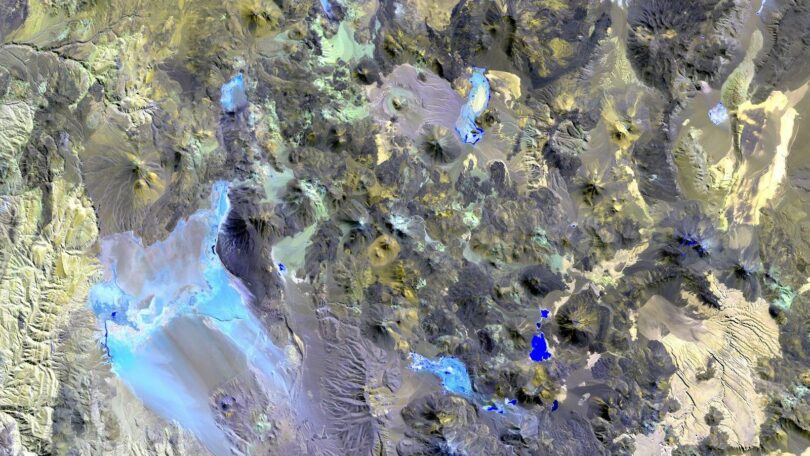The world around us is a magnificent tapestry of perplexities and enchantments, where humankind’s insatiable craving for connectivity has propelled us into a future teeming with technological wonders. Yet, nestled within this digital age lies a disconcerting paradox: our dependence on a centralized internet, entangling us in a web whose control and accessibility lie in the hands of a select few. But fear not, for the time has come to embark on a revolutionary journey that embraces the necessity of a decentralized internet. A transformative shift that promises to unleash a burst of liberty, creativity, and endless possibilities, reconnecting us with the true essence of connectivity. So, embrace curiosity and open your minds to the imminent revolution that will redefine the very fabric of our online existence.
In today’s digital age, connectivity is the lifeblood of our society. It shapes the way we communicate, work, and access information. The internet has been instrumental in revolutionizing connectivity, connecting people from all corners of the globe. However, as our reliance on centralized internet systems grows, so does the need for a new approach to ensure a more secure, robust, and inclusive future.
Imagine a world where internet access is not limited to a handful of powerful corporations or governments. A decentralized internet holds the key to such a future, where power is distributed among users themselves. It empowers individuals to take control of their online presence, safeguard their privacy, and ensure freedom of expression.
By embracing the necessity of decentralized internet, we break free from the shackles of a system that is vulnerable to censorship, surveillance, and corporate control. This paradigm shift paves the way for a truly open and democratized digital landscape, fostering innovation and collaboration like never before.
One of the primary advantages of a decentralized internet is its resilience in the face of disruptions. As the traditional internet infrastructure relies heavily on centralized servers, it is prone to single points of failure. In contrast, a decentralized internet spreads the load across a vast network of interconnected nodes, ensuring that even if some nodes go offline, the system continues to function without interruption.
The decentralized nature of the internet also makes it more difficult for malicious actors to compromise the system. In a centralized system, a single breach could have far-reaching consequences, putting sensitive data and privacy at risk. With a decentralized approach, where data is stored and encrypted across multiple nodes, the chances of a successful attack are significantly reduced.
Moreover, a decentralized internet promotes equal access to information, bridging the digital divide that plagues our society. In many parts of the world, lack of internet connectivity restricts individuals from educational opportunities, job prospects, and critical services. By embracing a decentralized model, we create an infrastructure that is open and accessible to all, empowering marginalized communities and driving economic growth.
In order to fully embrace the necessity of decentralized internet, we need to prioritize the development of technologies that enable its implementation. Blockchain technology, for instance, holds immense potential in creating a decentralized web. Its distributed ledger system ensures transparency, security, and immutability, providing a solid foundation for a decentralized internet.
As we embark on this journey towards a decentralized future, it is crucial to address the challenges that lie ahead. We need to foster a collaborative environment where innovators, policymakers, and users come together to shape the future of connectivity. By creating open standards, implementing robust security measures, and advocating for digital rights, we can unleash the true potential of the decentralized internet.
Revolutionizing connectivity through the embrace of decentralized internet is not just a technological shift. It is a paradigm shift that heralds a new era of empowerment, freedom, and inclusivity. Let us seize this opportunity to shape a future where connectivity is a fundamental right, and the internet is truly by the people, for the people.
Unleashing the Potential: Understanding the Essence of Decentralized Internet
Overview
The advent of the decentralized internet presents an unprecedented opportunity to revolutionize connectivity and reshape the very fabric of our digital existence. Gone are the days of relying on centralized authorities to control and regulate our online interactions. Instead, decentralized internet empowers individuals, liberating them from the clutches of intermediaries and fostering a new era of freedom, privacy, and innovation.
The Essence of Decentralization
At its core, decentralized internet harnesses the power of distributed networks, ensuring that no single entity has control over the flow of information. This decentralized architecture is achieved through technologies such as blockchain, peer-to-peer networks, and cryptographic protocols that enable direct person-to-person communication, data storage, and transactional exchanges without the need for intermediaries.
The essence of decentralization lies in the removal of bottlenecks and gatekeepers, as well as the restoration of trust in the digital realm. By eliminating central authorities, decentralized internet democratizes access to information, ensuring that censorship, surveillance, and data manipulation become relics of the past. The erosion of intermediaries fosters transparency, accountability, and autonomy, fueling a new wave of creativity and collaboration among connected individuals.
Unleashing the Potential
Decentralized internet unlocks a world of possibilities, paving the way for a more equitable and inclusive digital landscape. By its very nature, it transcends geographical boundaries, bridging the gap between developed and developing nations, and providing unprecedented opportunities for economic empowerment. Blockchain-based decentralized finance platforms facilitate borderless transactions, enabling individuals around the world to access banking services and participate in global markets.
Moreover, the essence of decentralization lies in its ability to empower individuals in unprecedented ways. In a decentralized internet ecosystem, users have full control over their data, enabling them to monetize their digital presence and protect their privacy. The rise of decentralized social media platforms allows individuals to connect and share information without the fear of surveillance or the undue influence of algorithms. This revolution in connectivity redefines the relationship between individuals and the digital world, making it truly user-centric.
Bursting Boundaries
The decentralized internet is not limited to revolutionizing individual experiences; it has the potential to transform industries and reshape societies. With its unparalleled security and immutability, blockchain technology serves as the foundation for decentralized applications (DApps) that are challenging traditional systems across various sectors.
In the domain of healthcare, for example, decentralized internet allows for the secure sharing of patient data among healthcare providers, ensuring seamless and accurate diagnoses while preserving patient privacy. In the realm of supply chain management, decentralized internet enables transparency and traceability, eliminating the complexities of traditional supply chains and combating issues such as counterfeiting and unethical practices. The applications are boundless, spanning finance, education, governance, and beyond.
Conclusion
The revolutionizing potential of decentralized internet intersects with the necessity of embracing it. The essence of decentralization lies in its ability to empower individuals, foster trust, and unleash transformative innovation. By embracing decentralized internet, we embark on a path towards a more inclusive, transparent, and resilient digital ecosystem that brings us closer to a truly connected world.
Challenges of Centralization: Exploring the Downfalls of Current Internet Architecture
The internet, as we know it today, operates on a centralized architecture where power is concentrated in the hands of a few major tech giants. While this structure has undoubtedly brought about immense connectivity, it is not without its flaws. In this post, we delve into the challenges posed by centralization and explore the dire need for a decentralized internet.
-
Loss of Privacy: As tech giants amass enormous amounts of user data, concerns over privacy have skyrocketed. Centralized systems can inadvertently expose personal information, leaving individuals vulnerable to data breaches, identity theft, and malicious surveillance. Embracing decentralization enables users to take control of their own data and protect their privacy.
-
Single Point of Failure: Centralized systems present a significant risk of a single point of failure. When one entity controls the majority of internet infrastructure, a disruption or attack on their servers can bring down entire networks, causing widespread disruptions and potential chaos. Decentralization, on the other hand, distributes power and resources across multiple nodes, reducing the risk of catastrophic failures.
-
Limited Innovation: Centralization often stifles innovation by creating high entry barriers for newcomers. Tech giants, with their dominance in the market, can dictate terms, limiting competition and hindering progress. Decentralized internet, on the contrary, offers an open playing field where individuals and small businesses can freely contribute their ideas, fostering creativity and driving innovation.
-
Censorship and Control: Centralized platforms have the authority to exercise control over the content users can access, censoring information and stifling free speech. Decentralized networks empower individuals by removing gatekeepers and providing unrestricted access to information, ensuring freedom of expression and democratizing the flow of knowledge.
-
Inequality in Access: Centralized internet infrastructure is often concentrated in urban areas and developed regions, leaving rural and marginalized communities at a disadvantage in terms of connectivity. By embracing decentralization, we can revolutionize connectivity, bridging the digital divide and providing equal access to information, opportunities, and resources for all.
-
Scaling Challenges: As the user base continues to grow, centralized systems face scalability issues. With a limited capacity to handle increasing traffic, service disruptions become more frequent, impeding the seamless flow of information. Decentralized networks, with their distributed nature, have the potential to scale more efficiently, ensuring the internet can accommodate future demands.
-
Lack of User Autonomy: In centralized systems, users often have little say in how their data is used or monetized. With decentralization, individuals gain greater autonomy over their digital presence, allowing them to decide how their data is shared, stored, and utilized, creating a more empowered and user-centric internet experience.
Embracing a decentralized internet infrastructure is not without its own set of challenges, but its potential benefits to privacy, innovation, accessibility, and user empowerment are enormous. It is time for us to revolutionize connectivity and reshape the internet landscape, paving the way for a more open, inclusive, and resilient digital future.
The Power of Decentralization: Examining the Benefits of a Decentralized Internet
The concept of a decentralized internet has been gaining traction in recent years, as more and more people are recognizing the potential benefits it can bring to the digital landscape. By distributing power away from centralized authorities and placing it in the hands of individuals, a decentralized internet has the power to revolutionize connectivity as we know it.
One of the primary advantages of a decentralized internet is its ability to promote freedom of expression. In a centralized system, a small group of entities or organizations controls the flow of information and can impose restrictions on what can be shared or accessed online. This can lead to censorship and limited access to certain ideas or viewpoints.
However, with a decentralized internet, power is distributed across a network of interconnected nodes, making it much more difficult for any single entity to control or manipulate the flow of information. This opens up a world of possibilities for free expression, allowing individuals to share their thoughts, ideas, and creativity without fear of censorship or restriction.
Another significant benefit of a decentralized internet is enhanced privacy and security. In a centralized system, personal data is often stored in large databases controlled by a single entity, making them vulnerable to hacking and unauthorized access. This poses a serious threat to individuals’ privacy and can lead to data breaches and identity theft.
On the other hand, a decentralized internet disperses personal data across multiple nodes, encrypting it and ensuring that no single party has complete control over it. This not only makes it more difficult for hackers to gain access to sensitive information but also gives individuals greater control over their own data. As a result, users can enjoy more secure online experiences and have a higher level of confidence in the platforms they use.
Beyond freedom of expression and privacy, decentralization also offers the potential for greater innovation and resilience. In a centralized system, innovation is often bottlenecked as the decision-making power rests in a few hands. This restricts competition and limits the possibilities for new ideas and technologies to flourish.
However, with a decentralized internet, anyone can participate and contribute to the network. This fosters a culture of innovation and collaboration, allowing for the rapid development of new applications, services, and technologies. Moreover, the distributed nature of a decentralized internet also makes it more resilient to attacks or disruptions, as the network can continue to function even if certain nodes go offline.
In conclusion, the power of decentralization in the context of the internet cannot be understated. By embracing the necessity of a decentralized internet, we have the potential to transform the way we connect, communicate, and create online. From promoting freedom of expression and enhancing privacy and security to fostering innovation and resilience, the benefits of a decentralized internet are far-reaching and hold immense promise for a more open, inclusive, and empowering digital future.
Overcoming Obstacles: Addressing Concerns and Potential Roadblocks
The decentralized internet is an innovative and all-encompassing concept that has the potential to revolutionize connectivity as we know it. By embracing this transformative technology, we are confronted with numerous obstacles and concerns, as well as potential roadblocks that need to be addressed systematically.
One of the primary concerns associated with decentralized internet is its complex and inherently complicated infrastructure. The current centralized model has been ingrained in our society for decades, and transitioning to a decentralized system requires meticulous planning and execution. Technical challenges, such as scalability and interoperability, must be thoroughly studied and overcome to ensure a seamless and efficient decentralized network.
Another obstacle that arises when embracing the decentralized internet is the issue of security. With data being spread across multiple nodes rather than being concentrated in one place, the potential for breaches and unauthorized access increases. This calls for the development and implementation of robust security protocols that can safeguard users’ privacy, while simultaneously allowing for easy access to information.
Furthermore, the decentralized internet brings forth concerns regarding governance and regulations. In a decentralized ecosystem, decision-making processes become more diverse and distributed, making it challenging to establish a unified set of rules and regulations. Striking the right balance between maintaining individual freedom and ensuring a fair and just digital environment requires extensive collaboration and discussion among stakeholders.
Additionally, the widespread adoption of decentralized internet faces obstacles related to infrastructure and accessibility. Developing countries or regions with limited resources may struggle to keep up with the required technological advancements to support a decentralized network. Bridging the digital divide becomes imperative in order to ensure equal access to the decentralized internet and prevent the creation of new forms of inequality.
Despite these challenges, the potential benefits of embracing the decentralized internet far outweigh the obstacles. By distributing data and power, the decentralized internet can foster greater transparency, inclusion, and resilience. It allows for peer-to-peer communication, eliminating the need for intermediaries and reducing the risk of censorship or manipulation. Transforming the internet into a truly decentralized system empowers individuals, gives them control over their data, and promotes collaborative innovation.
To overcome these obstacles, a multi-faceted approach is required. Collaboration between governments, businesses, and individuals is essential to develop and implement standardized protocols, security measures, and regulation frameworks. Funding and support should be allocated to research and development efforts that address scalability, interoperability, and infrastructure challenges. Education and awareness campaigns must be initiated to ensure widespread understanding and participation in the decentralized internet movement.
In conclusion, while the journey towards embracing the decentralized internet comes with its fair share of obstacles and concerns, they must be met head-on to unlock the full potential of this technological revolution. By addressing scalability, security, governance, and accessibility challenges, we can pave the way for a connected future that prioritizes individual empowerment and fosters innovation on a global scale. Together, we hold the power to shape the future of connectivity and create a decentralized internet that benefits all.
Building the Foundation: A Promising Vision for a Decentralized Future
In this post, we will delve into the exciting prospects of a decentralized internet and explore how it can revolutionize connectivity as we know it. By embracing this necessary shift, we can unlock a future where opportunities abound and power is restored to the users.
Imagine a world where we are no longer tethered to central authorities dictating the rules of the internet. A decentralized future holds the promise of reclaiming control over our data and online experiences. It envisions a network not governed by a single entity, but rather shaped by the collective efforts of its participants.
Decentralized internet seeks to address the issues that plague the current landscape: data privacy, censorship, and the monopolistic control of tech giants. By dispersing power, we can create a more resilient and inclusive digital ecosystem. With this foundation, a myriad of transformative possibilities emerges:
- Data Ownership: In a decentralized internet, individuals regain sovereignty over their data. No longer treated as mere commodities, personal information can be securely stored and shared, ensuring privacy and control.
- Enhanced Security: Through decentralized protocols, the internet becomes more robust against cyber threats. By eliminating central points of failure, the system becomes less vulnerable to hacking and DDoS attacks, bolstering the resilience of our online infrastructure.
- Freedom of Expression: A decentralized future dismantles the barriers that restrict free speech. Content creators can autonomously share their ideas without fear of censorship or surveillance, empowering diverse voices and fostering a truly inclusive digital society.
- Financial Empowerment: Decentralized technologies, such as blockchain, enable peer-to-peer transactions without intermediaries. This democratizes financial systems, granting individuals greater control over their money and access to global markets.
- Economic Equality: The decentralized internet can bridge the digital divide, bringing economic opportunities to underserved regions. With increased accessibility and reduced barriers to entry, entrepreneurs from all walks of life can participate and thrive in the digital economy.
While the vision of a decentralized internet is promising, challenges lie ahead. We must overcome scalability issues, ensure usability, and navigate regulatory landscapes. Collaborative efforts from technologists, entrepreneurs, and policymakers are required to address these complexities and bring this transformative vision to fruition.
As we push forward, embracing the necessity of a decentralized internet, we must remain vigilant, critically evaluating the trade-offs and benefits. By building a strong foundation guided by principles of openness, security, and inclusivity, we can pave the way for a future where connectivity is truly revolutionized, empowering individuals worldwide.
Collaboration is Key: The Role of Governments, Technology Companies, and Individuals
In our rapidly evolving digital world, one truth remains constant: collaboration is key. As technology continues to shape our societies, the interplay between governments, technology companies, and individuals becomes increasingly crucial. Nowhere is this more evident than in the realm of connectivity, where the decentralized internet is revolutionizing the way we interact and communicate. Embracing the necessity of a decentralized internet is not just a choice but a necessity for the future.
In this new era of connectivity, governments play a pivotal role in shaping policies that support and promote a decentralized internet. Recognizing the importance of internet access as a basic human right, governments must work hand in hand with technology companies to bridge the digital divide and ensure that every individual has equal opportunity to participate in the digital economy. By investing in infrastructure, expanding broadband capabilities, and implementing innovative policies, governments can empower their citizens to thrive in the interconnected world.
Technology companies, on the other hand, are the driving force behind the development and implementation of decentralized internet solutions. These companies have the expertise and resources to create innovative technologies that enhance connectivity, privacy, and security. From decentralized networks to peer-to-peer platforms, they are at the forefront of revolutionizing the way we access and share information. To truly embrace the necessity of a decentralized internet, technology companies must collaborate with governments, actively participating in policy discussions and ensuring that their technologies align with the goals of an inclusive and accessible digital future.
While governments and technology companies play crucial roles in revolutionizing connectivity, individuals also have a responsibility to actively engage and shape the decentralized internet. Every individual’s online activities and choices have the power to influence the direction of the digital landscape. By advocating for internet freedom, privacy, and digital literacy, individuals can challenge the status quo and push for a more decentralized online environment. It is through individual actions, such as supporting open-source projects, embracing encryption, and fostering community-led initiatives, that the true potential of decentralized connectivity can be realized.
The future of connectivity lies in collaboration, where governments, technology companies, and individuals come together to shape a decentralized internet that benefits all. Only by recognizing the necessity of this transformation can we truly embrace the possibilities offered by a decentralized internet, with its increased privacy, security, and accessibility. Let us join hands and work towards creating a digital landscape that empowers and connects us all.
Empowering Users: Taking Control of Privacy and Security in a Decentralized Internet
In an ever-evolving digital landscape, our understanding of privacy and security has become intertwined with the idea of a decentralized internet. The traditional model of a centralized internet, where individuals rely on large corporations to handle their data, is being challenged by a new wave of connectivity that puts power back into the hands of users.
Through decentralization, users are no longer at the mercy of a single authority, but rather become the masters of their own digital destinies. This shift in power not only empowers individuals to take control of their privacy and security but also revolutionizes the very concept of connectivity itself.
Gone are the days of entrusting our personal information to faceless entities only to discover the extent of their data breaches in headlines. With decentralized internet, users have the ability to embrace innovative solutions that prioritize their privacy and security, all while staying seamlessly connected.
By leveraging cutting-edge technologies such as blockchain and distributed networks, decentralization offers a robust and resilient framework for protecting sensitive data. The power of these technologies lies in their ability to distribute information across numerous nodes, each verifying and validating transactions. This consensus-driven approach not only eliminates the single point of failure but also ensures that the control over data remains firmly in the hands of its rightful owners: the users themselves.
With privacy and security as the guiding principles, a decentralized internet fosters an environment where individuals can freely navigate the digital landscape without sacrificing their personal information. The user-centric design of decentralized applications (dApps) ensures that individuals have complete control over their data, granting them the freedom to choose which aspects of their lives they wish to share with the world, and which they wish to keep private.
Moreover, the decentralized internet enables individuals to break free from the limitations imposed by traditional centralized systems. By eliminating intermediaries, users reap the benefits of faster transaction speeds, reduced costs, and enhanced transparency. The power of peer-to-peer interactions fosters a sense of trust and collaboration, creating an ecosystem where privacy, security, and connectivity go hand in hand.
Embracing the necessity of a decentralized internet is not just a technological revolution; it is a societal awakening. As users become empowered to take control of their privacy and security, a paradigm shift occurs, challenging entrenched power structures and giving rise to a more equitable digital landscape.
In this decentralized world, innovation thrives, and user-centric solutions shape the future of connectivity. The possibilities are limitless as individuals embrace the decentralized internet, forging their own paths and reshaping the very fabric of the digital universe.
So let us collectively embark on this journey, where privacy, security, and connectivity merge into a harmonious symphony, transforming the way we interact, transact, and thrive in the digital age. The decentralized internet awaits – join the revolution today.
Transforming the Economy: Opportunities and Threats in a Decentralized Digital Landscape
The digital landscape has experienced a remarkable shift, propelling us into an era of decentralized internet. This seismic transformation has not only disrupted traditional economic paradigms but has also presented society with unprecedented opportunities and threats, begging us to discern their implications.
One of the most captivating aspects of a decentralized digital landscape is the immense potential for empowering individuals to take control of their connectivity. No longer beholden to centralized authorities, people can chart their own destinies by participating in peer-to-peer networks that foster collaboration and innovation. The advent of blockchain technology, for instance, has revolutionized financial transactions, eliminating the need for intermediaries and allowing for seamless cross-border transfers. This peer-to-peer connectivity empowers individuals, giving rise to a new wave of entrepreneurs and disrupting existing business models.
But with every opportunity comes a threat, and the decentralized digital landscape is no exception. The freedom that decentralized internet provides also brings with it an element of uncertainty. As power shifts from centralized entities to the masses, ensuring a secure and reliable online environment becomes paramount. Innovations like smart contracts and decentralized storage networks have the potential to transform various industries, but they also expose us to new vulnerabilities. The ability to bypass intermediaries and perform transactions directly increases the risk of fraud, data breaches, and hacking incidents. It becomes imperative for us to develop robust security measures to safeguard our digital infrastructure and protect the interests of individuals.
Furthermore, the rise of decentralized internet has prompted a rethink of traditional regulatory frameworks. As power and control diffuse across networks, it becomes a challenge to enforce regulations and monitor activities effectively. The fluid nature of decentralized platforms means that those with malicious intent can exploit loopholes, conduct illicit activities, and evade traditional forms of oversight. Policymakers and regulators face the daunting task of striking a delicate balance between fostering innovation and ensuring ethical practices, all while grappling with the ever-evolving landscape of technology.
Amidst these opportunities and threats, it is essential for organizations and individuals to adapt and embrace the necessity of decentralized internet. Collaboration and knowledge-sharing become invaluable tools in navigating these uncharted territories. By leveraging blockchain technology, for example, businesses can establish transparent supply chains, building trust and loyalty among customers. The embracing of decentralized networks also paves the way for greater inclusivity, bridging the digital divide and empowering marginalized communities to participate in the digital economy.
In conclusion, the decentralized digital landscape is a double-edged sword, holding immense potential as well as significant risks. By embracing this necessity, we can unlock the transformative power of decentralized internet, revolutionizing the way we connect, collaborate, and conduct business. However, we must approach this newfound freedom mindfully, investing in security measures, rethinking regulatory frameworks, and fostering collaboration to ensure a resilient and inclusive digital future.
Protecting Digital Rights: Ensuring Freedom of Speech and Expression Online
In this rapidly evolving digital age, the quest for protecting digital rights has become more crucial than ever before. As we navigate the vast landscape of the online world, it is essential to safeguard the fundamental values of freedom of speech and expression. Our ability to connect, share ideas, and engage in dialogue should not be hindered by oppressive structures or centralized control.
Imagine a future where the internet is truly decentralized, where power is in the hands of the many rather than the few. Decentralization revolutionizes connectivity, ushering in a new era of freedom, innovation, and democratization. It stands at the forefront of the battle to protect our digital rights, ensuring that every individual has an equal opportunity to express themselves and participate in the global conversation.
One of the key advantages of a decentralized internet is the enhanced security and privacy it offers. In this decentralized ecosystem, individuals have greater control over their personal data, reducing the risk of surveillance and data breaches. Decentralized platforms empower users to take charge of their online presence, protecting their right to privacy and enabling them to make informed choices about their digital footprint.
Furthermore, a decentralized internet promotes inclusivity and diversity. Instead of being controlled by a select few entities, the power is distributed across a network of nodes. This fosters a more robust and resilient digital environment, where censorship and gatekeeping become far less influential. Everyone has an equal opportunity to voice their opinions, and no single authority can dictate what is acceptable or not. This empowers marginalized groups and ensures that their perspectives are not silenced or overshadowed.
Embracing a decentralized internet also paves the way for innovation and collaboration on a global scale. By breaking down the barriers of centralized control, individuals are free to experiment, create, and collaborate in unprecedented ways. Decentralized platforms enable the development of cutting-edge technologies and applications, opening up new avenues for economic growth and creativity.
However, with great power comes great responsibility. While a decentralized internet offers immense benefits, it also presents challenges that need to be addressed. Ensuring the protection of digital rights in a decentralized landscape requires the development of robust governance frameworks and policies. Collaboration between governments, technology companies, and civil society is crucial to strike the right balance between freedom and responsibility, while also mitigating the risks associated with malicious actors and harmful content.
In conclusion, a decentralized internet is the way forward in protecting digital rights and ensuring freedom of speech and expression online. It propels us towards a more inclusive, secure, and innovative digital world. Embracing decentralization revolutionizes connectivity, enabling individuals to reclaim control over their data, fostering diversity and inclusivity, and unleashing unprecedented opportunities for collaboration and innovation. Let us champion this transformative vision and work together to create a truly decentralized and free internet for all.
Ensuring Accessibility: Bridging the Digital Divide through Decentralized Internet
The concept of decentralized internet has emerged as a powerful force in the digital landscape. With increasing concerns over internet accessibility and the growing digital divide, the necessity of revolutionizing connectivity through decentralized internet has become undeniable.
Decentralized internet refers to a system where the control of internet infrastructure is distributed among many users, rather than being centralized in the hands of a few entities. This decentralized approach seeks to tackle several challenges that exist in the realm of internet access and usage, providing a more inclusive and equitable digital environment.
One of the key advantages of decentralized internet is its ability to overcome the limitations posed by traditional, centralized models. By removing the reliance on a single point of control, decentralized internet ensures enhanced resilience and fault tolerance. Whether it’s a natural disaster, government censorship, or technical failures, a decentralized infrastructure offers a robust and reliable alternative, capable of withstanding various disruptions.
The digital divide, a term used to describe the gap between those who have access to and can effectively use digital technologies and those who don’t, continues to be a pressing issue. Decentralized internet can play a crucial role in bridging this divide by providing affordable, accessible, and reliable internet connectivity to underserved regions and marginalized communities.
Decentralized internet empowers individuals and communities to take ownership of their digital lives. It eliminates the need for intermediaries and centralized authorities, giving individuals control over their data and privacy. This shift towards user-centric models fosters a sense of digital sovereignty, enabling users to protect their personal information and engage in online activities without undue surveillance or manipulation.
Furthermore, decentralized internet has the potential to foster innovation and creativity in ways previously unimaginable. With the removal of central gatekeepers, the barriers to entry are significantly lowered, allowing for the emergence of diverse voices and ideas. This democratization of information and knowledge encourages collaboration, experimentation, and the exploration of new possibilities.
To fully embrace the necessity of decentralized internet, it is essential to address various challenges and obstacles. One such challenge is the need for robust and user-friendly decentralized infrastructure. Building and maintaining a decentralized internet ecosystem requires the collaboration of developers, technologists, civil society organizations, and policymakers working towards shared goals.
Education and awareness also play a critical role in ensuring the successful adoption of decentralized internet. Creating platforms for knowledge sharing, training programs, and promoting digital literacy empower individuals to make informed choices and participate actively in shaping the decentralized internet landscape.
In conclusion, revolutionizing connectivity through decentralized internet is a transformative step towards ensuring accessibility and bridging the digital divide. By embracing this decentralized model, we can create a more inclusive, resilient, and user-centric digital ecosystem, unlocking a world of opportunities for all.
The Way Forward: Strategies and Recommendations for Embracing a Decentralized Internet
The internet has revolutionized the way we connect and communicate, but it has also exposed several vulnerabilities. Centralized control over the internet has led to concerns regarding privacy, security, and censorship. It’s time to embrace a decentralized internet to address these issues and ensure a more open, secure, and resilient future.
The Power of Decentralization
Decentralization is the key to unlocking the full potential of the internet. By distributing power, control, and information across a network of independent nodes, we can create a more democratic and transparent digital ecosystem. Instead of relying on a single governing authority, a decentralized internet empowers individuals and communities, fostering creativity, innovation, and collaboration.
1. Empowering User Privacy
Privacy is a fundamental right that should be protected online. With a decentralized internet, users gain greater control over their personal data, as it is not stored in a central server vulnerable to breaches or misuse. Blockchain technology, for instance, can enable encrypted storage of personal information, granting users ownership and control over their data. This shift towards self-sovereign identity ensures that users can interact online without compromising their privacy.
2. Strengthening Security
Centralized systems are prime targets for cyber attacks. A decentralized internet reduces this risk by eliminating single points of failure. Instead of attacking a central server, hackers would need to compromise multiple nodes, making it significantly more challenging to breach security. By utilizing technologies such as peer-to-peer networks and distributed ledger systems, the decentralized internet creates a more resilient and secure infrastructure.
3. Overcoming Censorship
Censorship is a growing concern, with governments and authorities controlling access to information. A decentralized internet can be a powerful tool against censorship, as it removes the ability of a single entity to dictate what can and cannot be shared. By leveraging blockchain and peer-to-peer technology, content can be stored and distributed across a network, making it nearly impossible to censor or remove information. This free flow of information empowers individuals, protects freedom of speech, and promotes a more equitable society.
Recommendations for Embracing the Decentralized Internet
1. Education and Awareness:
- Introduce decentralized internet concepts in educational curricula at all levels.
- Raise awareness through public campaigns and forums.
- Encourage users to understand the benefits and implications of a decentralized internet.
2. Collaboration and Partnerships:
- Facilitate collaborations between technology companies, governments, and research institutions to develop decentralized protocols and infrastructure.
- Promote open-source initiatives that enable the development of decentralized applications and systems.
- Encourage partnerships between decentralized projects and traditional internet service providers to accelerate adoption and scalability.
3. Regulatory Framework:
- Develop regulatory frameworks that support the growth and adoption of decentralized technologies.
- Ensure laws and regulations prioritize user privacy and security.
- Promote competition and innovation by removing unnecessary barriers for decentralized platforms and applications.
4. Investment and Funding:
- Invest in research and development of decentralized technologies.
- Provide funding and grants to support startups and projects in the decentralized internet space.
- Encourage venture capitalists and private investors to recognize the potential of decentralized internet and allocate resources accordingly.
The way forward is to embrace the necessity of a decentralized internet. By empowering user privacy, strengthening security, and overcoming censorship, we can revolutionize connectivity and create a more inclusive, free, and resilient digital world.
Final Thoughts
In a world that revolves around connectivity, the necessity of a decentralized internet becomes clearer with each passing day. The revolutionizing impact of embracing this fundamental shift is not just about convenience but about reclaiming our digital lives, empowering individuals, and widening the scope of possibilities.
As the world becomes increasingly interconnected, it is essential to break free from the shackles of a centralized internet that caters to the interests of a select few. By decentralizing our online realm, we take a step towards democratizing access, data privacy, and creative expression.
Imagine a world where the internet is not controlled by a handful of entities, where power lies in the hands of the people. This revolutionary concept fosters innovation, encourages collaboration, and breaks down barriers that obstruct progress. In this decentralized future, we transcend the limitations of today’s internet, opening doors to endless possibilities.
From the grassroots of blockchain technology to the emergence of peer-to-peer networks, the decentralized internet offers a disruptive solution to the problems that plague our current digital ecosystem. It unleashes a wave of creativity and resilience, inspiring individuals to take ownership of their online experiences. No longer held hostage by centralized authorities, we can freely explore, express, and connect.
But the path to a decentralized internet is not without challenges. It requires collective awareness, technological advancements, and a commitment to change. It demands the active participation of governments, corporations, and individuals alike. Collaboration will be key as we navigate uncharted territories, ensuring that the decentralized internet becomes a collective reality rather than a distant dream.
Revolutionizing connectivity by embracing the necessity of a decentralized internet is not a utopian vision; it is a call to action. It is a pursuit of a digital landscape where power is distributed, privacy is sacred, and opportunities are boundless. It is a journey that will redefine how we interact, create, and thrive in the digital age.
So, let us unite in this quest for a decentralized future. Let us champion innovation, openness, and inclusion. Together, we can rewrite the rules of connectivity and shape a digital world that truly serves its users. The revolution is at hand, and it is time to seize the possibilities that lie ahead. Welcome to the decentralized internet, where a new era of connectivity awaits.








Leave a Comment